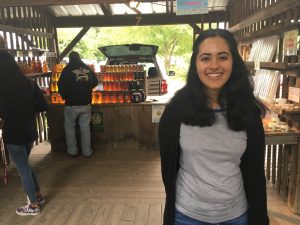Last Saturday, I got a wonderful 10-minute massage at Rose. I was debating whether or not to get the massage because Saturday was an extremely busy day for me. The club that I am the president of was hosting its largest event of the semester and I was back on campus briefly between two shopping trips at the time of my massage. I planned out my time and realized that I could probably make the massage and decided to go – a decision that I didn’t regret.
When I first sat down for the massage, I tried to relax but my mind was racing – I was going over plans for the evening and reviewing all the tasks that needed to be done. But I soon scolded myself and tried to relax. I tried to stop thinking and just focused on the movements of my masseuse. She spend a lot of time massaging my back and neck area but also focused a lot of effort on areas that I didn’t realize she would massage, like my shoulders and arms. This surprised me because I don’t usually think about the fact that stress effects all parts of my body – not just the most obvious ones like my back.
The overall experience reminded me to make time to focus on my own health and well-being by making time to relax. On the day of a prelim or a big event, like this day, I usually wouldn’t take time for myself. I would study in every moment that I had or try to plan out every detail I could. But this massage reminded me that making time for myself can be as simple as a 10-minute break and easy enough to do on even the most stressful of days. Last semester, I took a PE class about stress management and relaxation. I left the class promising to make time everyday for some sort of relaxing or pleasurable activity, whether it be reading for pleasure or starting the day with meditation. It was easy enough to fall out of that habit but I have a renewed interest in pursuing it again. As finals roll around, I want to take time each day to destress and I hope you do too.

